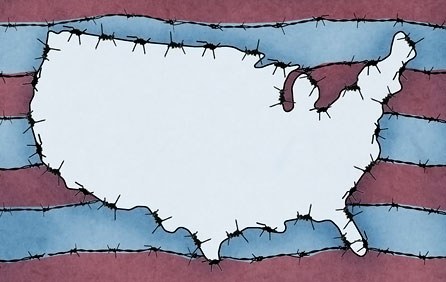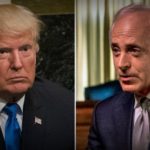
Image credit: American Enterprise Institute
President Trump promised to put “America First,” and so far he has succeeded. Unfortunately, Trump seems to define “America First” by breaking promises with allies and leaving the country isolated among the global community. Although this may be the intent for President Trump and the skeptics in his administration, the results of his foreign policy may bring great harm to America’s economy and security. Trump’s impulsive nature has already undone years of international cooperation on the Paris Accord, and his insults hurled towards European NATO allies threatens decades of cooperation there as well. As new challenges threaten the international global order, the Trump administration has not explained how its withdrawal from the world community benefits America or protects the nation from these threats, which include a resurgent Russia and terrorist groups like ISIS. [1]
The issue facing the Trump administration is not unique to America. Most nations in recent history (especially powerful nations like the US) have had to reconcile the issue of interventionism vs. isolationism, and most economic and national security issues can be understood through this spectrum. Nations that are interventionist will typically support international cooperation, membership in regional organizations such as NATO, the EU or ASEAN, and are more likely to support intervention in military conflicts abroad. Isolationist nations, on the other hand, are more likely to focus inward on domestic issues, defense (as opposed to military intervention) and protectionist economic policies. Of course, a nation may adopt interventionist attitudes in certain areas and isolationist policies in others; for example, Japan is militarily isolationist (a direct result of the devastation they experienced in World War II) but economically interventionist/globalist.
Since World War 1, the United States has generally adopted interventionist policies in both economic and security issues. For instance, participation in both World Wars was an interventionist action for the United States that led to interventionist results like the creation of the UN, a stable economic order promoting free trade, and the unrivalled explosion in American economic growth in the 20th century. Despite these benefits, there are many today who call for a shift in America’s policies towards a so-called America First platform. This shift, championed by Donald Trump and his supporters, would see the US withdraw from NAFTA and the Paris Accords (a process currently underway), demand compensation from America’s allies for the cost of their defense, and reduce diplomatic and military intervention in foreign affairs.
Trump’s recent foreign policy trip demonstrated his commitment to the idea of America First in some ways, but not universally. His massive sale of military arms to Saudi Arabia, and his expressed desire to “solve” the Israel/Palestine conflict are interventionist attitudes well in line with previous administrations. However, with regards to Europe, Trump was far more isolationist. In a meeting with NATO officials, Trump took the opportunity to chastise members for insufficient military spending as specified in the NATO charter. Unfortunately, Trump’s characterization of the issue was inaccurate: in 2014, NATO members agreed to a 2% of GDP military spending goal by 2024. Just three years after this agreement, Trump is criticizing European allies, many of whom are still recovering from economic instability of the last decade. [2] He also (inaccurately) suggested that US taxpayers are suffering from this neglect by our NATO allies.
Following Trump’s interactions with European leaders, German Chancellor Angela Merkel declared that Germany can no longer depend on others for its economic and defense needs. [3] Trump has been a critic of the EU appears to be strengthening the organization despite his efforts. [4] America’s retreat from Europe creates a void that Germany and France (under pro-EU president Emmanuel Macron) seem eager to fill. Trump’s announcement that the US will withdraw from the Paris Accord was similarly met with statements from European leaders that they will not rely on the United States on fighting climate change. In addition, China reaffirmed its commitment to the Accord. Some speculate that China, once a leader in carbon emissions but now a leader in green energy technology, will gladly replace the United States as a major player on the global stage due to America’s loss of credibility on climate change and other issues. [5]
The net result of President Trump’s America First platform has been a deterioration of our relationship with Europe with no tangible benefits to the American people. On the other hand, polling does support the notion that the “America First” concept is popular: while so-called elites, including the wealthiest Americans, and members of the foreign policy establishment, believe in the importance of defending America’s allies through military means, the average American places far less importance on the issue. [6] However, I argue that all Americans benefit from a more interventionist approach to foreign policy issues in ways that are not immediately obvious.
America is unique in that the devastating wars of the 20th century were largely fought abroad; America’s economy, infrastructure and populace were spared the devastation experienced by other combatants such as the UK, Germany, Japan, China, and the USSR. Indeed, America benefited during and after the war through its economic and military support of our allies, and America has been known as the “Leader of the Free World” ever since. Today, Russia is an expansionist power, China postures for a greater role in Pacific politics, and both nations spend lavishly on their military. ISIS and other terrorist groups conduct attacks inside the US and our European allies despite losing the war in their territory. Climate change threatens everyone, and could result in economic devastation and increased conflict as a result. It is not the time for America to retreat from the global stage; rather, we must maintain our position as a leader, strengthen our commitment to Europe, and, as a symbol, reverse the ill-informed decisions of President Trump on climate change at the soonest available opportunity.
REFERENCES AND FOOTNOTES:
[1] Edel, H. B. (2017, May 29). The End of History Is the Birth of Tragedy. Retrieved from http://foreignpolicy.com/2017/05/29/the-end-of-history-is-the-birth-of-tragedy/
[2] Golino, L. (2017, May 31). America First Also Means Europe First. Retrieved from http://www.atlanticcouncil.org/blogs/new-atlanticist/america-first-also-means-europe-first
[3] Cole, J. (2017, May 29). Germany: We Europeans must Depend on Selves, not Trump’s USA. Retrieved from https://www.juancole.com/2017/05/germany-europeans-depend.html
[4] Heilbrunn, J. (2017, May 28). Is Trump Pushing Merkel to Create A German Superpower? Retrieved from http://nationalinterest.org/blog/the-buzz/trump-pushing-merkel-create-german-superpower-20892
[5] Knopman, D., Lempert, R. J., Fischbach, J. R., & Preston, B. L. (2017, June 02). The Big Bet: Withdrawing from the Paris Climate Agreement. Retrieved from https://www.rand.org/blog/2017/06/the-big-bet-withdrawing-from-the-paris-climate-agreement.html
[6] Preble, C. A. (2017, May 31). America’s Transatlantic Relationship Is Overrated. Retrieved from http://nationalinterest.org/blog/the-skeptics/americas-transatlantic-relationship-overrated-20931



